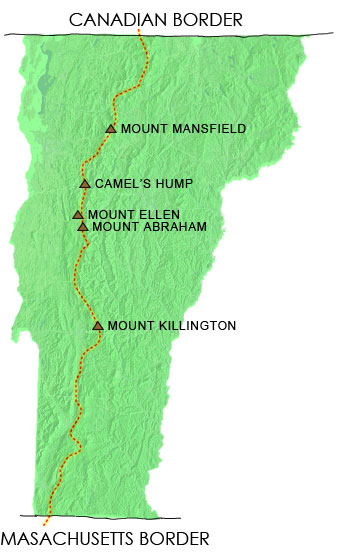Charting the Peaks: An Exploration of Vermont’s 4,000-Footers
Related Articles: Charting the Peaks: An Exploration of Vermont’s 4,000-Footers
Introduction
In this auspicious occasion, we are delighted to delve into the intriguing topic related to Charting the Peaks: An Exploration of Vermont’s 4,000-Footers. Let’s weave interesting information and offer fresh perspectives to the readers.
Table of Content
Charting the Peaks: An Exploration of Vermont’s 4,000-Footers

Vermont, the Green Mountain State, is renowned for its picturesque landscapes, rolling hills, and dense forests. Nestled within this natural tapestry lies a collection of majestic peaks, known as the "4,000-footers." These summits, rising above the 4,000-foot mark, are a testament to the state’s geological history and a magnet for outdoor enthusiasts. Understanding the significance of these peaks requires a deep dive into the world of Vermont’s 4,000-footers map.
A Map of Summits: Unveiling the Significance
The Vermont 4,000-footers map is more than just a geographical representation. It’s a roadmap for adventurers, a guide to the state’s natural heritage, and a tool for understanding the unique characteristics of Vermont’s landscape. The map highlights the locations and elevations of these prominent peaks, providing a visual understanding of their distribution across the state.
The Importance of the Map:
- Planning and Navigation: For hikers and mountaineers, the map serves as an essential tool for planning expeditions. It allows them to identify routes, assess distances, and estimate hiking times. The map also indicates trailheads, campsites, and other essential points of interest, making it invaluable for navigating the backcountry.
- Understanding Geology and Ecology: The map provides insights into the geological history of Vermont. The distribution of the 4,000-footers reflects the uplift and erosion processes that shaped the Green Mountains. Furthermore, the map reveals the diverse ecological zones associated with these peaks, showcasing the unique flora and fauna found at higher elevations.
- Conservation and Preservation: The map is a reminder of the importance of preserving Vermont’s natural beauty. It highlights the fragility of these ecosystems and encourages responsible outdoor practices. By understanding the location and significance of these peaks, individuals can contribute to the ongoing conservation efforts.
Beyond the Map: Unveiling the 4,000-Footers
The Vermont 4,000-footers map serves as a starting point for exploring these magnificent peaks. Each summit offers a unique experience, showcasing the diverse beauty of Vermont’s wilderness.
Notable Peaks:
- Mount Mansfield: As the highest peak in Vermont, Mount Mansfield offers challenging hikes with breathtaking panoramic views. Its iconic "Chin" rock formation is a popular landmark.
- Mount Killington: Known for its world-class ski resort, Mount Killington also presents a challenging ascent for hikers. The summit offers stunning views of the surrounding mountains.
- Mount Washington: While technically located in New Hampshire, Mount Washington is accessible from Vermont and offers a unique hiking experience. It’s renowned for its harsh weather conditions and challenging terrain.
Exploring the 4,000-Footers:
- Hiking: Hiking remains the most popular way to experience the 4,000-footers. Trails range from easy to extremely challenging, offering options for hikers of all skill levels.
- Backpacking: Backpacking allows for extended adventures, enabling hikers to immerse themselves in the wilderness for multiple days.
- Skiing and Snowshoeing: During the winter months, the 4,000-footers transform into winter wonderland, offering opportunities for skiing, snowshoeing, and backcountry skiing.
FAQs about the Vermont 4,000-Footers Map:
Q: How many 4,000-footers are there in Vermont?
A: There are 106 mountains in Vermont that rise above 4,000 feet.
Q: What is the highest 4,000-footer in Vermont?
A: Mount Mansfield, with an elevation of 4,393 feet, is the highest peak in Vermont.
Q: Are all the 4,000-footers accessible by trail?
A: While many 4,000-footers have established trails, some require off-trail hiking or scrambling, which can be challenging and dangerous.
Q: What are the best times of year to hike the 4,000-footers?
A: The best time to hike the 4,000-footers is during the summer months, from June to September, when conditions are generally mild and trails are clear. However, hikers should always check weather conditions before embarking on any journey.
Q: Are there any permits required to hike the 4,000-footers?
A: Many trails require permits, especially for overnight backpacking. It’s essential to research the specific requirements for each trail.
Tips for Hiking the 4,000-Footers:
- Plan Ahead: Research the trail, check weather conditions, and pack appropriate gear.
- Stay Hydrated: Bring ample water and electrolytes, as dehydration can be a significant concern at higher elevations.
- Be Prepared for Changing Conditions: Weather can change quickly in the mountains, so pack layers and be prepared for rain, wind, and cold temperatures.
- Leave No Trace: Practice responsible outdoor practices, pack out all trash, and stay on designated trails.
- Be Aware of Wildlife: Vermont’s wilderness is home to various wildlife, including bears. Learn about bear safety and practice appropriate precautions.
Conclusion:
The Vermont 4,000-footers map is a valuable tool for understanding and appreciating the state’s natural beauty. It serves as a guide for adventurers, a resource for conservationists, and a reminder of the importance of preserving Vermont’s wild landscapes. Whether you’re an experienced hiker or a novice explorer, the map provides a gateway to the heart of the Green Mountains, inviting you to discover the magic of Vermont’s 4,000-footers.








Closure
Thus, we hope this article has provided valuable insights into Charting the Peaks: An Exploration of Vermont’s 4,000-Footers. We hope you find this article informative and beneficial. See you in our next article!